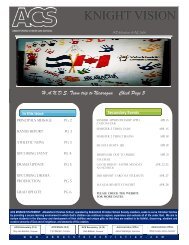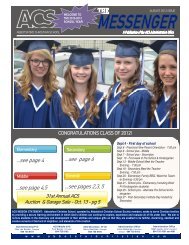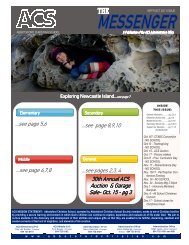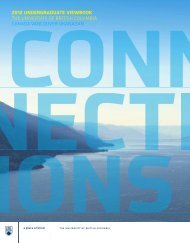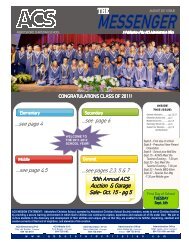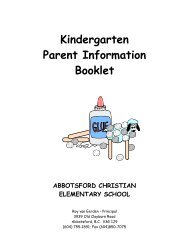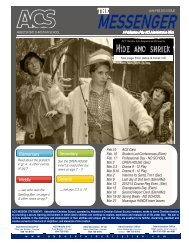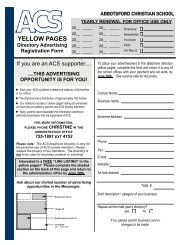Science Curriculum Map Grades K â 12 - Abbotsford Christian School
Science Curriculum Map Grades K â 12 - Abbotsford Christian School
Science Curriculum Map Grades K â 12 - Abbotsford Christian School
- No tags were found...
You also want an ePaper? Increase the reach of your titles
YUMPU automatically turns print PDFs into web optimized ePapers that Google loves.
Planning for Assessment (Teaching Strategies), Assessment Indicators (Assessment Activities) and resources are listed in course overviews<br />
Grade Essential Questions/Unit Questions Content / Enduring Understandings Learning Outcomes: By the end of grade level, the students will: Special Events:<br />
Field Trips, Service Projects, Speakers,<br />
Culminating Activities, etc.<br />
10 Processes of <strong>Science</strong> - integrated<br />
Life <strong>Science</strong>: Sustainability of Ecosystems<br />
What is the relationship between the living and<br />
non-living elements in an ecosystem<br />
What are the relationships amongst the living<br />
elements in an ecosystem<br />
How are ecosystems maintained and<br />
changed<br />
What roles and responsibilities do humans<br />
have with regard to ecosystems as stewards<br />
of God’s creation<br />
Physical <strong>Science</strong>: Chemical Reactions and<br />
Radioactivity<br />
How is our understanding of matter shaped by<br />
our experiences, experiments, and<br />
discoveries<br />
How can our scientific knowledge be a fact, a<br />
theory or something else<br />
What are the limitations of scientific models<br />
What is it about atoms that make them the<br />
“simplest unit” of matter<br />
What is the nature of matter and how does it<br />
react and interact<br />
How do we communicate our scientific<br />
information<br />
How does society misuse its scientific<br />
knowledge What are scientific “ethics”<br />
Physical <strong>Science</strong>: Motion<br />
What are the “laws” that govern movement<br />
How do we communicate our scientific<br />
information about motion<br />
How can the relationship between a time<br />
interval and distance be demonstrated<br />
Is there anything not in motion<br />
Earth and Space <strong>Science</strong>: Energy Transfer in<br />
Natural Systems<br />
How is the transfer of energy a key component<br />
of sustaining Earth and its inhabitants<br />
What is the relationship between energy<br />
transfer and weather systems, ocean currents,<br />
natural phenomena<br />
How does mankind “play God” with the natural<br />
systems in place<br />
What roles and responsibilities do humans<br />
have with regards to ecosystems as stewards<br />
of God’s creation<br />
Processes of <strong>Science</strong> – integrated<br />
Life <strong>Science</strong>: Sustainability of Ecosystems<br />
Biotic and abiotic factors<br />
Chemical cycles<br />
Food webs, pyramids, biomes<br />
Ecological knowledge and natural phenomena<br />
Physical <strong>Science</strong>: Chemical Reactions and Radioactivity<br />
Modern atomic theory (Bohr, Lewis)<br />
Bonding, balancing, classification of reactions<br />
Acid, base, indicators<br />
Organic and inorganic compounds<br />
Isotopes, fission, fusion, decay and radioactive decay curves<br />
Physical <strong>Science</strong>: Motion<br />
Uniform, acceleration, velocity, time intervals<br />
Earth and Space <strong>Science</strong>: Energy Transfer in Natural Systems<br />
Heat and thermal energy<br />
Atmosphere, wind, density, pressure, climate<br />
Earth and Space <strong>Science</strong>: Plate Tectonics<br />
Plate tectonics, volcanoes, earthquakes<br />
Processes of <strong>Science</strong><br />
A1 demonstrate safe procedures<br />
A2 perform experiments using the scientific method<br />
A3 represent and interpret information in graphic form<br />
A4 demonstrate scientific literacy<br />
A5 demonstrate ethical, responsible, cooperative behaviour<br />
A6 describe the relationship between scientific principles and technology<br />
A7 demonstrate competence in the use of technologies specific to investigative<br />
procedures and research<br />
Life <strong>Science</strong>: Sustainability of Ecosystems<br />
B1 explain the interaction of abiotic and biotic factors within an ecosystem<br />
B2 assess the potential impacts of bioaccumulation<br />
B3 explain various ways in which natural populations are altered or kept in equilibrium<br />
Physical <strong>Science</strong>: Chemical Reactions and Radioactivity<br />
C1 differentiate between atoms, ions, and molecules using knowledge of their structure<br />
and components<br />
C2 classify substances as acids, bases, or salts, based on their characteristics, name and<br />
formula<br />
C3 distinguish between organic and inorganic compounds<br />
C4 analyse chemical reactions, including reference to conservation of mass and rate of<br />
reaction<br />
C5 explain radioactivity using modern atomic theory<br />
Physical <strong>Science</strong>: Motion<br />
C6 explain the relationship of displacement and time interval to velocity for objects in<br />
uniform motion<br />
C7 demonstrate the relationship between velocity, time interval, and acceleration<br />
Earth and Space <strong>Science</strong>: Energy Transfer in Natural Systems<br />
D1 explain the characteristics and sources of thermal energy<br />
D2 explain the effects of thermal energy within the atmosphere<br />
D3 evaluate possible causes of climate change and its impact on natural systems<br />
Earth and Space <strong>Science</strong>: Plate Tectonics<br />
D4 analyse the processes and features associated with plate tectonics<br />
D5 demonstrate knowledge of evidence that supports plate tectonic theory<br />
Life <strong>Science</strong>: Sustainability of Ecosystems<br />
Local trail and creek exploration<br />
Earth and Space <strong>Science</strong>: Plate Tectonics<br />
Visit geographic locations<br />
Bring in a geologist to talk about P-T,<br />
volcanism, earthquakes, etc.<br />
Earth and Space <strong>Science</strong>: Plate Tectonics



